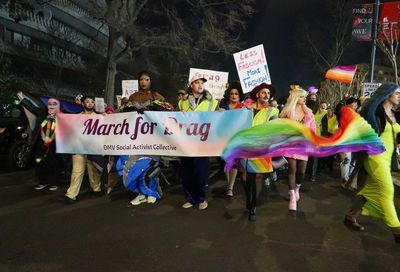Trump administration’s “religious liberty” guidance rolls back birth control coverage
Justice Department and HHS want to allow employers to refuse to provide insurance coverage for contraception


The Trump administration has rolled back a policy that will allow any employer to claim a moral or religious objection to the Affordable Care Act’s provisions requiring them to provide their employees with insurance coverage for birth control.
The new policy, which takes place immediately, was announced on Friday morning, as part of a push by the U.S. Department for Health and Human Services to expand the number of companies, both for-profit and nonprofit, that exempt themselves from having to pay for birth control.
The shift in birth control policy aligns with a similar policy, also released on Friday, outlining the Justice Department’s stance on legal conflicts where a person’s religious beliefs conflict with government mandates. In two memos, the department’s lawyers both provided an overarching philosophy from which DOJ lawyers are expected to approach those conflicts and outlined 20 principles that federal employees and agencies are expected to follow in terms of employment, contracting and programming.
“Religious liberty is not merely a right to personal beliefs or even the right to worship in a sacred place,” the second DOJ memo reads. “It also encompasses religious observance and practice. Except in the narrowest of circumstances, no one should be forced to choose between living out his or her faith and complying with the law. Therefore, to the greatest extent practicable and permitted by law, religious observance and practice should be reasonably accommodated in all government activity.”
In the principles memo, the Trump administration outlines the principles that were the basis for the Supreme Court’s 2014 decision in the Hobby Lobby case that found that private employers with sincere religious beliefs opposing contraception could exempt themselves from the Affordable Care Act’s requirements of having to provide coverage for birth control, with no out-of-pocket costs.
“[The Religious Freedom Restoration Act of 1993] prohibits the federal government from substantially burdening a person’s exercise of religion, unless the government demonstrates that the application of such a burden to the religious adherent is the least restrictive means possible of achieving a compelling governmental interest,” the memo reads, adding that RFRA applies to all actions taken by federal agencies.
“A governmental action substantially burdens an exercise of religion under RFRA if it bans an aspect of an adherent’s religious observance or practice, compels an act inconsistent with that observance or practice, or substantially pressures the adherent to modify such an observance or practice.”
The memo also notes that, under RFRA, the government is not allowed to second-guess a person’s — or an organization, association, or for-profit company’s — purported religious beliefs. Opponents of these expanded “religious liberty protections” argue that this principle allows people to abuse RFRA by claiming religious beliefs as justification for their action or inaction.
The new guidance, as set forth by the Justice Department and enforced by HHS, is potentially problematic for LGBTQ people on a number of levels. First, subsets of the LGBTQ community, including bisexual women and transgender men, benefit from access to birth control guaranteed by the ACA’s contraceptive mandate.
Second, the broad degree of what can constitute a “religious exemption” could allow employers to discriminate against or deny benefits to LGBTQ employees. Examples of this could include an employer refusing to provide coverage for pre-exposure prophylaxis to a gay man because of objections to homosexuality, or to homosexuals who are not celibate, or refusal to cover hormones or surgical costs, even if they have been deemed medically necessary, to a transgender person.
“The Trump administration is actively cloaking controversial policies under so-called ‘religious exemptions’ when the policies, in fact, directly attack marginalized communities who often experience discrimination at a daily basis,” Sarah Kate Ellis, president of GLAAD, said in a statement. “President Trump must be called out for hiding behind so-called ‘religious exemptions’ and held accountable for his clear anti-LGBTQ and anti-woman agenda.”
“Today the Trump-Pence administration launched an all-out assault on LGBTQ people, women, and other minority communities by unleashing a sweeping license to discriminate,” Chad Griffin, president of the Human Rights Campaign, said in a statement. “This blatant attempt to further Donald Trump’s cynical and hateful agenda will enable systematic, government-wide discrimination that will have a devastating impact on LGBTQ people and their families.”
Rebecca Isaacs, the executive director of Equality Federation, said that the administration’s actions highlight the need for Congress to take action to specifically enshrine protections against discrimination in federal law. She also expressed skepticism about the Justice Department’s rationale for issuing the “religious liberty” guidance.
“Freedom of religion is one of our nation’s most fundamental values, which is why it is already strongly protected by the First Amendment to the Constitution,” Isaacs said in a statement. “But the freedom of religion does not give people the right to impose their beliefs on others, to harm others, or to discriminate.”
Support Metro Weekly’s Journalism
These are challenging times for news organizations. And yet it’s crucial we stay active and provide vital resources and information to both our local readers and the world. So won’t you please take a moment and consider supporting Metro Weekly with a membership? For as little as $5 a month, you can help ensure Metro Weekly magazine and MetroWeekly.com remain free, viable resources as we provide the best, most diverse, culturally-resonant LGBTQ coverage in both the D.C. region and around the world. Memberships come with exclusive perks and discounts, your own personal digital delivery of each week’s magazine (and an archive), access to our Member's Lounge when it launches this fall, and exclusive members-only items like Metro Weekly Membership Mugs and Tote Bags! Check out all our membership levels here and please join us today!


























You must be logged in to post a comment.